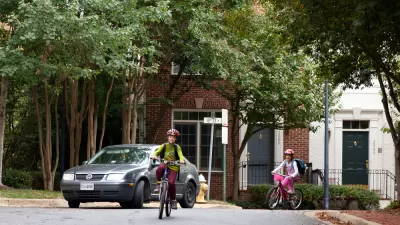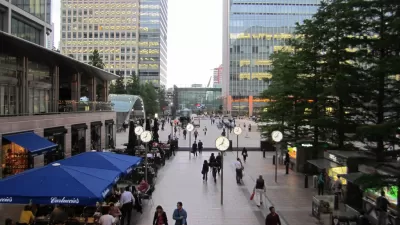Richard Florida

Big, Corporate 'Back to the City' Movement Continues
In the latest news, chemical company Chemours will remain in downtown Wilmington, Delaware's largest city. In June, McDonald's decamped from Chicago's suburbs for downtown. This latest corporate trend is the topic of a New York Times article.

Who Moves and What It Means for Growing Cities
It’s difficult to grow a city. Tax revenues limit budgets and there are trade-offs involved in how to spend those resources. Any city trying to allocate resources to grow needs to know who moves.

Op-Ed: Jane Jacobs Wouldn't Recognize the Cities of Today
Without children at the center of activity, the urban neighborhoods of today offer little compared to the ideals expressed by Jane Jacobs, according to this strongly worded critique of contemporary urbanism.
Expert Voices 2016: Urban Policy and the Presidential Election
Penn IUR Faculty Fellows and Scholars weigh in on the 2016 Presidential election. What urban issues should the candidates be focusing on?

On the Creative Neighborhood's Two Basic Forms
Richard Florida discusses a study comparing the neighborhoods that house "creative" industries. Science and tech tends to favor low-density office parks, while arts and cultural industries prefer mixed-use urban districts.

Metros Seek Balance Between Fragmentation and Amalgamation
As the world's cities grow ever larger, local governments constantly ask themselves which is better: amalgamating into one metro-wide government, or maintaining autonomy among fragmented jurisdictions? The answer remains unclear.

Affluence Still at Home in the Suburbs
Commentators often say an influx of wealth is transforming American cities. But if prosperity is really still suburban, what are the consequences for the environment?
Employment Growth in Large, Dense Cities Paces Recovery
A study from the Oregon Office of Economic Analysis finds evidence that large, dense metropolitan areas have experienced the most complete recovery following the Great Recession.
Inequality Deepening in U.S. Metros of all Sizes and Locations
A recent post by Richard Florida, working in partnership with the Martin Prosperity Institute, examines where (and how much) income inequality grew in U.S. metros between 2006 and 2012.

Are We There Yet? Affordability in the 'New Normal'
In the new normal, an affordable lifestyle is suddenly of interest to a larger circle of us. Here's what some interesting innovators are doing about it, between now and when our politics and legal structure fully align with our needs.
Technology, Talent, and Tolerance: The Creative Culture
Creativity isn’t a theory about hipsters and the latte set. The key driver of a resilient economy is the same thing that binds us as humans – our shared creativity. Hazel Borys reviews Richard Florida's latest creative culture ideas.
How Cities Can Help Get the Kids to Daycare
Erin Anderssen takes a critical look at the role of our cities in the provision of much needed childcare. While municipally-delivered childcare has been successful in Scandinavia, some Canadian cities are left playing with alternative approaches.
Population Growth and Prosperity Don't Go Hand in Hand
If your city isn't attracting hordes of new residents does that mean it's not growing economically? Richard Florida and his colleagues seek to undermine those who equate population growth with economic health.
Kotkin and Florida Duke it Out Over 'Limits' of the Creative Class
After a decade of debate, Richard Florida's theories on the 'creative class' have been championed by many, and challenged by others (perhaps none more forcefully than author Joel Kotkin). In recent articles, the two are battling it out once again.
Ways to Fail at Form-Based Codes 01: Don’t Articulate a Vision
Like any tool, form-based codes must be wielded skillfully for beautiful results. Hazel Borys kicks off a series on ways we go awry.

Florida to Obama: Establish a Department of Cities
Lamenting the lack of a single big, transformative urban idea during President Obama's first term, Richard Florida urges the president to establish a new cabinet-level Department of Cities to build a "lasting urban legacy."
Marching Towards More Walkable Communities
Richard Florida interviews Jeff Speck about his new and highly praised book "Walkable City." The two authors discuss why cities should become more walkable to meet the needs of the "Walking Generation."

High Density Means More Economic Growth and More Happiness, Too
Using new analysis of recent US Census data, Richard Florida demonstrates that “[c]ities and regions where density is more concentrated near their urban cores — appear to gain the biggest economic advantage.” That, and a tad more happiness.
Where's Your Happy Place?
Now can you qualify, quantify, and index it? Hazel Borys would like you to do so, and gives this data review to help you get started.
Understanding the Importance of Place to the Creative Class
Richard Florida discusses why "quality of place", rather than job opportunity, is the determining factor in where creative-minded people choose to live.
Pagination
Urban Design for Planners 1: Software Tools
This six-course series explores essential urban design concepts using open source software and equips planners with the tools they need to participate fully in the urban design process.
Planning for Universal Design
Learn the tools for implementing Universal Design in planning regulations.
Smith Gee Studio
City of Charlotte
City of Camden Redevelopment Agency
City of Astoria
Transportation Research & Education Center (TREC) at Portland State University
US High Speed Rail Association
City of Camden Redevelopment Agency
Municipality of Princeton (NJ)


































